|
|
|
Sort Order |
|
|
|
Items / Page
|
|
|
|
|
|
|
| Srl | Item |
| 1 |
ID:
172287
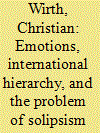

|
|
|
|
|
| Summary/Abstract |
This study offers an explanation for Beijing’s seemingly self-defeating approach to the South China Sea that distances China ever more from the regional and international communities which it wants to lead and join while drawing in the foreign military presence that it seeks to keep at a distance. Combining recent research on the role of emotions and on hierarchy in international politics, this article shows how the powerful narrative of national ‘humiliation’ and ‘rejuvenation’ has informed Chinese maritime politics. As the South China Sea became incorporated in the linear timeline of China’s 5000 year civilizational history, the US’ and its allies’ push-back against Beijing’s territorial claims deepened China’s ideational isolation. The ensuing state of solipsism increases the risk of violent confrontations.
|
|
|
|
|
|
|
|
|
|
|
|
|
|
|
|
| 2 |
ID:
189267
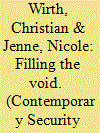

|
|
|
|
|
| Summary/Abstract |
Thirty years after the downfall of the Soviet-led communist bloc, the United States-led liberal international order is seen as coming to an end. Policymakers have converged on the need to safeguard the “rules-based order” across the newly coined “Indo-Pacific” region. However, policy and scholarly debates lack clarity about what exactly is to be preserved, and why the terms of the “rules-based order” and the “Indo-Pacific” have rapidly found their way into policy debates despite their contested meaning. Analyzing developments in regional multilateralism, we find that mainstream discourses purport static conceptions of order, which are often conflated with United States-centered trans-Pacific alliance relationships. The ensuing problem of order stems in large part from the fact that multilateral projects for building alternate orders, undertaken since the early 1990s, have remained far below their potential. We conclude that emerging forms of multilateral cooperation across the enlarged “Indo-Pacific” region have partially filled this void.
|
|
|
|
|
|
|
|
|
|
|
|
|
|
|
|
| 3 |
ID:
123146
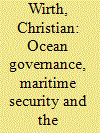

|
|
|
|
|
| Publication |
2012.
|
| Summary/Abstract |
High economic growth rates, the revolution in telecommunications and the end of the Cold War have brought about rapid and profound changes to the domestic as well as regional environments of Northeast Asian governments. The maritime sphere, where increasingly militarized state boundaries delineate political authority and economic activities link increasingly interdependent communities therein, bears high significance for the study of regional cooperation. This paper looks at how the maritime sphere of Northeast Asia is represented in common political and academic discourses of international relations. It finds that maritime affairs are firmly cast in the language of national security, and that empirical evidence against perceived threats and related security imperatives is often neglected if not completely ignored. The paper argues that the maritime space, due to its special character, has become the stage on which the consequences of modernity appear particularly strong. The relentless quest to develop and control the ocean clashes with the notion of the sea as a space of global trade and communication flow. At the same time, the ocean as an entity itself is excluded from the discourse because it is irreconcilable with the conception of the international system of sovereign territorial units. As a result, the maritime sphere is seen as a dividing element between nations rather than a connecting element, and salient environmental problems of the maritime space remain low on political and academic agendas. This is also a consequence of mainstream methods of political science that continue to reproduce discourses of territorial division and fail to offer alternative approaches suitable for the study of contemporary Northeast Asia.
|
|
|
|
|
|
|
|
|
|
|
|
|
|
|
|
| 4 |
ID:
141623
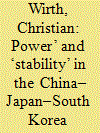

|
|
|
|
|
| Summary/Abstract |
Despite continuing economic liberalization and social integration, relations between Northeast Asian governments are often tense and lead to enhanced military readiness. Alongside confrontation in all three dyads, however, trilateral cooperation between China, Japan and South Korea has been evolving. This study shows that history problems, territorial disputes and geopolitical concerns lock the Chinese, Japanese and South Korean governments into a constellation that creates political space for the emergence of cooperative frameworks. The very fixation on material power and bilateral relationships reveals that power is being exercised in non-material ways in effect foreclosing alternative futures and reproducing existing structures including the pertaining security dilemmas.
|
|
|
|
|
|
|
|
|
|
|
|
|
|
|
|
| 5 |
ID:
165873
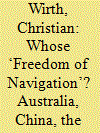

|
|
|
|
|
| Summary/Abstract |
The so-called freedom of navigation through the Malacca straits and the South China Sea, some of the world’s busiest trade routes, has long been of concern to scholars and practitioners of international politics in the region. Increasing tensions around territorial disputes recently propelled the issue to the forefront of global foreign and security policy making. Yet, despite the frequent invocation of threats to the ‘freedom of navigation’ for the justification of military measures to protect the ‘liberal rules-based order’, the substance of this rule or norm remains ambiguous and the nature of the threatened order unclear. Located at the confluence of the Indian and Pacific Oceans, Australian discourses represent a suitable case for clarifying both. Starting from the original provisions on navigational regimes in international law, this study analyses the meanings that officials, think tank analysts and academics have been attributing to the freedom of navigation and contextualize them in the evolving debate about order. Focusing on political rather than legal discourses, it finds that concerns with the freedom of navigation are largely unrelated to the safety of maritime transport. Instead, they serve as proxy for an increasingly static imagination of international order – written backward in time – to be secured.
|
|
|
|
|
|
|
|
|
|
|
|
|
|
|
|
|
|
|
|
|